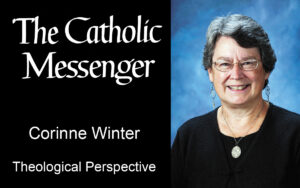By Corinne Winter
Current media coverage as well as the actions of legislators responding to the protests following the murder of George Floyd have centered on reform of policing. Those reforms are vital and long overdue as evidence abounds that Black people have been treated unjustly. They have been stopped, searched, detained, fined, imprisoned, injured and killed in disproportionate numbers. It has to stop.
 We also need to address ways in which racism is embedded in other systems of our society. In last week’s editorial, Barb Arland-Fye pointed to Black peoples’ experiences of economic disadvantage. Those experiences have been highlighted as well in the effects of the pandemic. People of color are disproportionately unemployed and underemployed. They often lack health insurance or access to good medical care.
We also need to address ways in which racism is embedded in other systems of our society. In last week’s editorial, Barb Arland-Fye pointed to Black peoples’ experiences of economic disadvantage. Those experiences have been highlighted as well in the effects of the pandemic. People of color are disproportionately unemployed and underemployed. They often lack health insurance or access to good medical care.
Journalist Chris Cuomo of New York cited many more areas of inequality. He cited statistics showing that even with the same education and doing the same jobs, Black people earn less that white people do. They experience greater difficulty in getting loans and thus are less likely to own homes or cars. The inequities begin during youth. Because of the ways in which public schools are financed, Black children often attend schools where staffing, facilities and resources are inadequate.
Are these theological issues? Perhaps not directly. But theologians and members of the Magisterium have often addressed the need for economic justice as an issue of fundamental human rights and dignity. As far back as the Fathers of the Church, St. Basil said that if I have two cloaks and my neighbor has none, then for me to keep the two would amount to an act of theft. St. Augustine proposed that if a man’s family were starving, then for that man to steal food from a wealthy person in order to feed his family would be a morally good act.
The Catechism of the Catholic Church, which addresses economic justice under the heading of the seventh commandment (Thou shalt not steal) includes this from St. Gregory the Great: “When we attend to the needs of those in want, we give them what is theirs, not ours” (CCC2446). St. Thomas Aquinas in the 13th century asserted that the right to private property is subordinate to the right of all people to have their basic needs met. These theologians based their teachings on what they found in Scripture: the frequent calls for justice found in the books of the prophets as well as parables, sayings and acts of Jesus.
The 19th and 20th centuries saw the development of what we generally refer to as “Catholic Social Tradition” in papal, episcopal and conciliar documents that address issues of economics as they appear in our industrial and post-industrial society. Among those that apply to the imbalance of opportunity among people of diverse races and ethnic groups are Pope St. John Paul II’s Laborem Exercens and Centisimus Annus. In those documents, the pope outlined the right of all people to be engaged in work that makes use of their gifts and brings the satisfaction of contributing to the common good. For that work, the person has a right to a just recompense that provides for the basic needs of the person and of the family. St. John Paul goes on to address the responsibilities of the state to assure equal access and just wages for all people without discrimination. He calls all individuals and groups involved in economic activity to assure that human rights are respected.
The issue of economic justice is vast and complex. It feels overwhelming, and we may feel tempted to brush it off as beyond our pay grade. Certainly many of us lack expertise in this area. Nonetheless, we need to recognize that our economy is among the systems that have embedded racism. At the very least, we can ask the question: what steps can we take? We can listen without becoming defensive to the experiences of those who have come up against the obstacles inflicted by racism. We can ask our political candidates whether they recognize the pervasive effects of racism in our economy and are committed to addressing them. We can recognize that the common good requires that all people have access to basic human goods of food, shelter, education and health care. Making those available and affordable may require a willingness on our part to support them through our taxes and the prices we pay.
Black Lives Matter. We need to say those words and act on them. Not because only Black Lives Matter, but because Black people have been told for far too long and in far too many ways that their lives are not as important as those of white people. We need to work on changing the systems in which racism is embedded. Economic systems are among those in need of change.
(Corinne Winter is a professor-emerita of St. Ambrose University, Davenport.)
Support The Catholic Messenger’s mission to inform, educate and inspire the faithful of the Diocese of Davenport – and beyond! Subscribe to the print and/or e-edition, or make a one-time donation, today!











